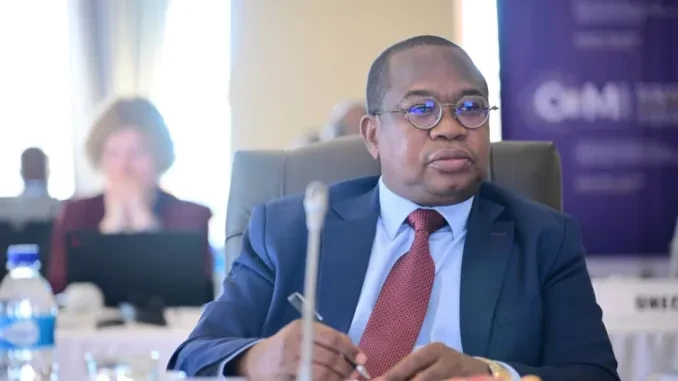
BY TAURAI MANGUDHLA AUSTRALIAN Securities Exchange (ASX) — listed independent upstream gas and oil focused company Invictus Energy (Invictus) has breathed life into the sleepy rural settlement of Muzarabani after commencement of works at its multibillion-dollar extraction site near the area.
Located in the Zambezi Valley basin, about 300km north east of Harare, the Zimbabwean capital, Muzarabani captured global attention in 2015, when news of potentially lucrative gas or oil endowment resurfaced, with the Australian firm saying it was determined to start off from work previously done by Total, to see if the riches really lie underground.
Work has since been going on in the past six years, and the firm is closer to drilling its firm test wells, a crucial phase of the project that is highly awaited both in Zimbabwe and Australia.
During a recent tour of the region, Weekly Digest was told that apart from the prospects of employment for locals with hundreds set to benefit once operations commence, the local tourism industry is already enjoying occupancy from groups of technicians setting up equipment and conducting preliminary surveys at the company’s mine.
That has been a huge boost for an industry that suffered up to US$1 billion write downs last year, as the industry was affected by the COVID-19 pandemic, which grounded airline and forced hotels to close shop.
Last week, the Tourism Business Council of Zimbabwe said the industry was taking baby steps towards recovery, but more work was required.
In Muzarabani, villagers said local shops had also been reporting increased consumption of food items and residents are optimistic their growth point would eventually turn into a full-fledged town as the big oil projects take shape.
“We had two teams of experts staying here for more than two weeks and my rooms were almost full as a result. This project is good for everyone and we are already feeling the trickle-down effect positively,” said a bed and breakfast proprietor in the area, who asked Weekly Digest not to publish her name.
- Chamisa under fire over US$120K donation
- Mavhunga puts DeMbare into Chibuku quarterfinals
- Pension funds bet on Cabora Bassa oilfields
- Councils defy govt fire tender directive
Keep Reading
“The shops around are also feeling the positive change and the hope is that they buy more from our community instead of bringing everything from Harare. Buying locally is good for our business and it uplifts our community,” she added.
Her view dovetailed into the current campaign foe Zimbabweans to utilise more domestic products than those produced by foreign firms.
Muzarabani chief Alfonce Chuzu said the company was employing a lot of locals with an estimated 60% of its unskilled labour coming from the community.
He said discussions with the company were underway to even increase the local employment headcount to 80%.
Chuzu also said businesses and local farmers were benefiting.
“We have been working well with the company and they have even called on locals to supply fresh farm produce, beans and other foodstuffs and this empowers our community,” said the traditional leader, adding that the community was looking forward to a bright future with improved livelihoods.
Prior to the coming in of Invictus, the area had been developed largely around a major cotton ginnery owned by Cottco in the area.
Cottco is the largest employer in the area too, directly at the ginnery and indirectly to farmers who produce cotton in the area.
Apart from cotton, the community depended on animal husbandry as maize production is less ideal in the area.
During a recent tour of the area, this publication witnessed a surge in traffic in the area, with a number of abnormal load trucks frequenting the area delivering earth-moving machinery and other equipment.
As recently reported by NewsDay, Invictus this month commenced the acquisition of the seismic data for its Cabora Bassa project in Zimbabwe.
The company reported that it has cleared 400km of ground ahead of the data acquisition and mobilised the vibriosis units to the field camp following the completion of maintenance and checks.
The company said it expected 2D seismic data to help refine the location and path of the planned Mzarabani-1 gas exploration.
The exploration is meant to test the potential of Cabora Bassa, which has been independently assessed to host prospective resources of about 9,25 trillion cubic feet of gas and 294 million barrels of condensate.
“The company is pleased to be commencing the seismic data acquisition in the coming days and the preparation for this campaign has gone well and all the equipment and personnel heading to the field,” said managing director Scott Macmillan.
“The preparations for the basin opening drilling campaign are progressing well and we are on track to select a rig and the service providers towards the end of this quarter and then commence formal contract negotiations and award,” Macmillan added.
The company’s asset portfolio consists of a prospective licence, Special Grant 4571, in the Cabora Bassa Basin in Zimbabwe.
The company believes the Cabora Bassa Basin In Zimbabwe is one of the largest under-explored interior rift basins on the African continent.
The company said SG4571 contained the Mzarabani conventional gas-condensate prospect, the largest undrilled prospect onshore Africa with an independent estimate of 8,2 Tcf + 247 million barrels gross mean unrisked basis of conventional gas-condensate in a stacked target.
Listed in 2018, Invictus has a market cap of US$93,6 million.
Last week, the company reported that US$30m seismic, gravity aeromagnetic and geochemical dataset was generated by Mobil during the 1990s, which moved away from the asset due to focus on oil and not gas.
Invictus said the dataset had now been reprocessed and applied updated understanding of other successful rift basin plays to Cabora Bassa, adding that there are several other high-quality and offshore oil and gas assets and operators within the region, including Shell and ExxonMobil and Total.
The location of the 250 000-acre large asset, Invictus said, is strategic and is expected to provide a solution to the southern African energy crisis.
Invictus owns 80% of Cabora Bassa project which received priority project status from the Zimbabwean government in January 2020.
A Petroleum Exploration Development and Production Agreement with the Republic of Zimbabwe was completed in the first quarter of the year.
This article first appeared in the Weekly Digest, an AMH Digital publication











